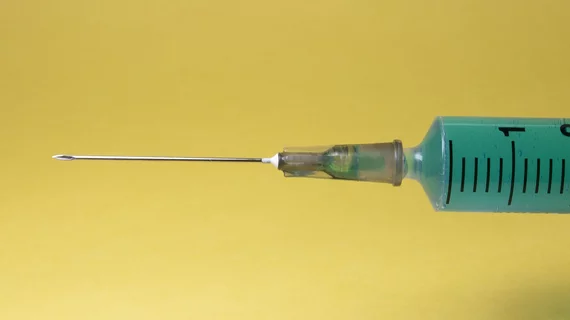PET radiotracer reduces false positives owed to COVID vaccination
Switching radiotracers can reduce the number of false positive findings on PET imaging that commonly occur following COVID vaccination.
A recent paper in the Journal of Nuclear Medicine reports that swapping from 18F-FDG to 68Ga-FAPI PET/CT imaging decreases vaccine-related tracer uptake in lymph nodes adjacent to patients’ injection site. Though the study was small—consisting of just 11 cancer patients—the findings were significant.
Participants underwent both 68Ga-FAPI and 18F-FDG imaging on the same day, within six weeks of receiving an mRNA COVID vaccination. The 18F-FDG PET/CT scans rendered significant tracer uptake in the lymph nodes for all 11 patients, which is especially problematic for cancer patients, experts involved in the study suggested.
“This observation is concerning as vulnerable groups, such as oncologic patients, undergo both regular COVID-19 booster shots and medical imaging,” study co-author Tristan T. Demmert of Essen University Hospital in Germany and colleagues explained.
Although the 18F-FDG PET/CT scans resulted in tracer uptake that could lead to false-positive results, the use of 68Ga-FAPI eliminated this concern, as it did not produce significant uptake in any of the 11 patients.
Additionally, 94% of all tumor lesions were detected using 68Ga-FAPI, compared to 73% using 18F-FDG PET/CT.
These results are important, as false positive findings can often “trigger false management decisions,” explained “In patients with suspected tumors in the axillary region, a costly follow-up was often recommended to avoid incorrect patient treatment. According to our results, this could have been prevented by using 68Ga-FAPI, which would have allowed higher tumor detection at the same time,” the authors noted.
The team suggested that 68Ga-FAPI could help to avoid vaccine-related misinterpretations due to uptake of 18F-FDG in lymph nodes without diminishing tumor detection. This is especially relevant since COVID booster vaccinations are expected to continue, the experts indicated.
The study abstract is available here.

